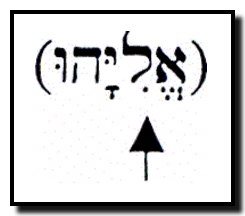
Question: Why do you use a W instead of a V in "Yahuwah"? My understanding is that the "V" was the original letter and was later changed to "W", with the "W" being a weaker vowel. We would not want to attach any weakness to the all-powerful, holy name! It seems that keeping the original "V" in the name would be the better choice.
Answer: Hebrew linguists consider [w] to be a weak vowel, but this should not be taken as a literal reflection on the power and character of the Almighty. In this context, "weak" simply means unaccented or open.
Weak vowels are used in closed-unaccented and open-accented syllables. Strong vowels are used in closed-accented and open unaccented syllables . . . An open (weak) syllable is a simple consonant with its vowel. . . . A closed (strong) syllable is consonant with vowel and another consonant . . . . ("Pronunciation Rules for Ancient Hebrew," TorahWellSprings.org.)
It is important to remember that YAHUWAH is an attempt to approximate the original sound of the sacred name, but written using English letters. Thus, the use of the letter [w]. According to the Oxford English Dictionary, "W" is quite unique to English within European language families: "In Europe (w) is thought to be peculiar to England . . . In Arabic however (w) is quite at home.".png)
Today, there are two primary pronunciations for Hebrew:
In German, [w] is pronounced labiodentaly, using the bottom lip against the top teeth producing the [v] sound. Yiddish is spoken widely by Jews today, but its influences should not be taken as an authority on ancient Hebrew. Yiddish is a High German language of Ashkenazi Jewish origin. Thus, the [w] sound would indeed be pronounced as a [v] because that is the sound it has in German. In English, however, this is not the case.
The German (Ashkenazic) influence arose within the last 1800 years, after the Jews were dispersed in 135 A.D. As Jewish communities gradually developed in Eastern, Central and Western Europe, German influence eventually made its mark on the Hebrew language. (Voy Wilks, "The Sixth Letter is Waw," March 3, 1996.)
However, most scholars accept Sephardi as closer to the original Hebrew.
In all the universities and through Israel, the Sephardic pronunciation has been adopted, since it is generally believed that this is the pronunciation nearest to the original . . . . (Menahem Mansoor, Biblical Hebrew, p. 33.)
Spanish is considered one of the "Latin" languages. But even in Latin, the [v] sound did not enter the language until the second century A.D. (See Funk & Wagnal's Encyclopedia, 1934 ed., under V.)
Again, [v] is a relatively recent new-comer to Biblical Hebrew and certainly was not used in the time of David or Moses..png)
Yahuwah gave to all nations their own languages when He confounded speech at the Tower of Babel. Languages change over time and this is a common occurrence. However, Yahuwah certainly was not influenced by Ashkenazi/German speech when He spoke His name to Moses!
"Not only did the Jews change the waw (W) to vav (V), but in recent times have also changed the Hebrew B to V as well. Therefore, Abraham becomes Avraham, and Yacob becomes Yacov, Tel Abib becomes Tel Aviv, and everyone gets confused. Did we really need two v's in Modern Hebrew?" (B. Earl Allen, Publish the Name of Yahuwah, p. 35.)
.png)

.png)